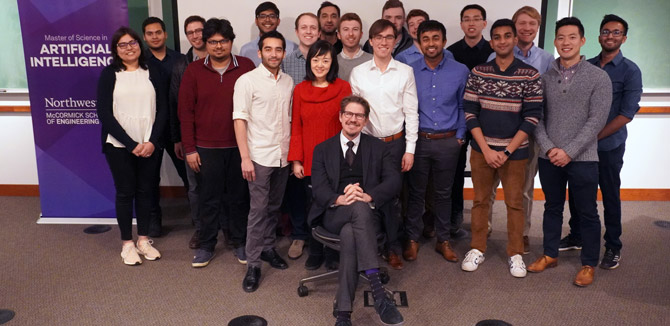Industry Partnerships, Technical Skills Prepare Inaugural Master’s in AI Class for Life After Graduation
Graduates land full-time positions as software engineers, data scientists, and consultants at Fortune 500 companies
Watch out, world. Northwestern Engineering’s inaugural Master of Science in Artificial Intelligence (MSAI) class is ready for you.
The MSAI program’s emphasis on weaving industry partnerships with classroom experience proved beneficial for MSAI’s first cohort. More than half of the graduating class secured full-time positions as software engineers, data scientists, and consultants at Fortune 500 companies including Amazon, Encyclopedia Britannica, Microsoft, and Capital One. Deloitte, one of MSAI’s many industry partners, made five job offers to MSAI graduates.
Not all students chose to follow a corporate path. One graduate applied the skills he mastered toward moving his entrepreneurial venture LineLeap forward in machine learning. Others used the MSAI program as a stepping-stone and leveraged the applied learning aspect of AI into research in PhD programs.
“With all the bumps and bruises along the way, the first MSAI cohort ended up being the perfect example of what AI, computer science, and engineering are at Northwestern,” said Kristian Hammond, Bill and Cathy Osborn Professor of Computer Science. “The students worked on real-world problems coming from industry and from across the University. They learned to focus on solving problems rather than simply applying technologies, while always considering the impact of their work. I am proud of every one of them.”
The graduates’ future plans come after a rigorous, 15-month full-time master’s degree program that challenged them to develop essential AI skills such as advanced computer vision, statistical pattern recognition, programming massively parallel processors with CUDA, and to work closely with industry partners to apply their skills.
“What’s special about the MSAI program at Northwestern Engineering is our students work with industries from the very first quarter,” said Kim Kieras, senior associate director of the MSAI program. “The program is not all about theory. Our students are building and designing systems then applying what they develop to the real world."
That real-world application is what attracted many of the graduates to the MSAI program. Nearly half of the 2018 cohort had no prior work experience, and the majority came from an engineering and computer science academic background. The students sought niche AI skills necessary to meet the economy’s growing demand for an AI-skilled workforce.
“Many of our students joined the program with strong programming experience,” Kieras said of MSAI students. “But they decided to be part of an AI focused program that would allow the benefit of specialized training in order to take their skills and know-how to the next level.”
As part of the MSAI curriculum, the graduates had the opportunity to use real data from industry partners, design and implement solutions, complete summer internships or work on research within AI labs at Northwestern, and complete a capstone project that would become part of their portfolios. Along with coursework, students attended other cocurricular events such as the MSAI professional speaker series, hackathons, and career events.
“The prominent industry partners, projects, frequent speakers, and networking events made sure I was able to get a head start with the external world said Rhett D’souza (MSAI ’19), a member of the 2018 cohort. “Even students entering the program without a computer science background are assured a place to apply their skills in the non-academic world.”
As the MSAI program continues to grow, future plans include exploring possible areas of interdisciplinary collaboration between AI and diverse disciplines, such as law and medicine. For example, fellows from Feinberg School of Medicine will participate in a future MSAI cohort designed to introduce AI and help their understanding of AI and its application to medicine.


